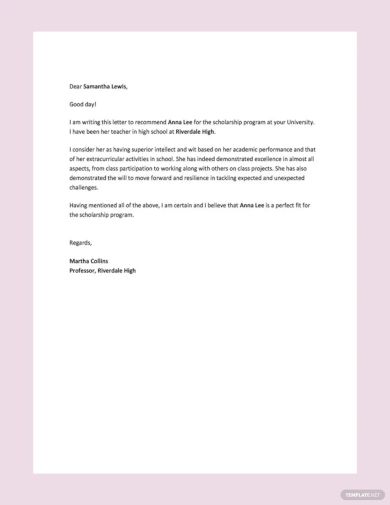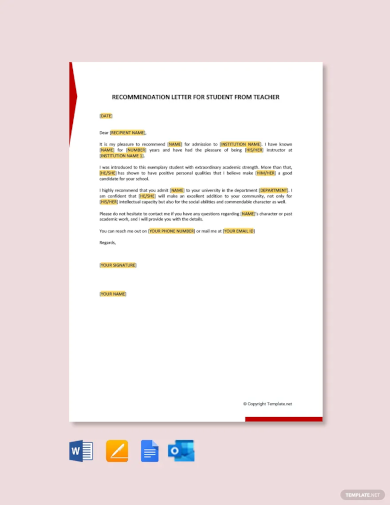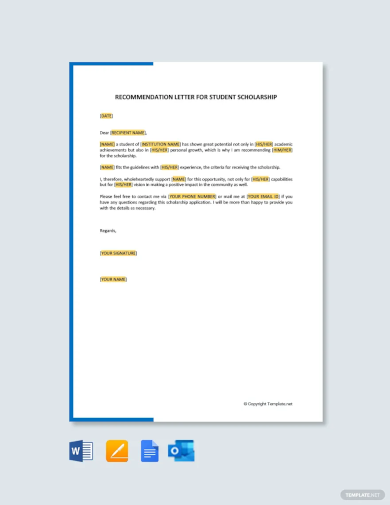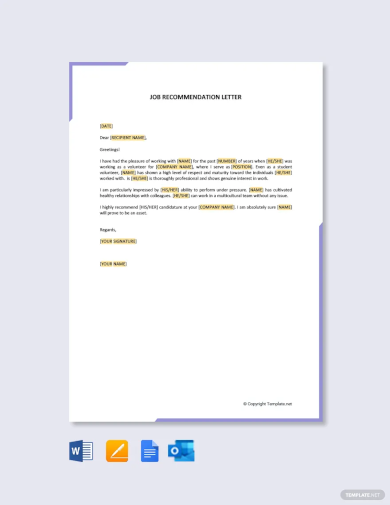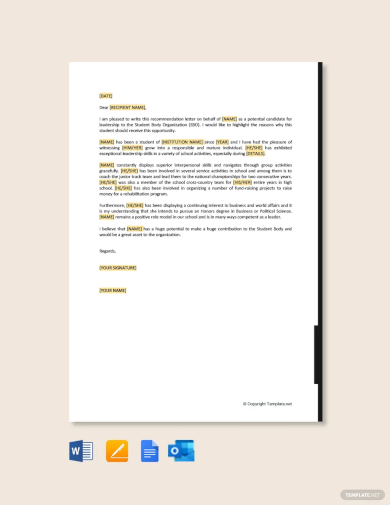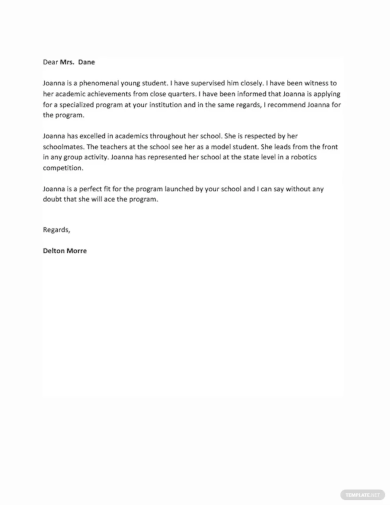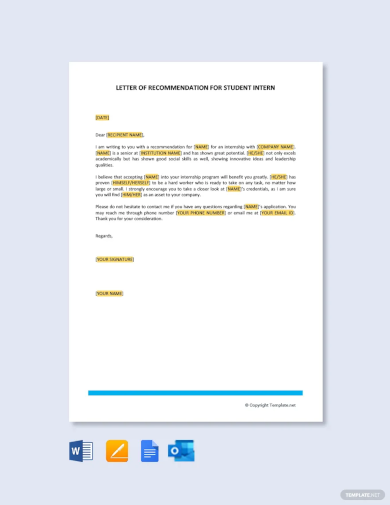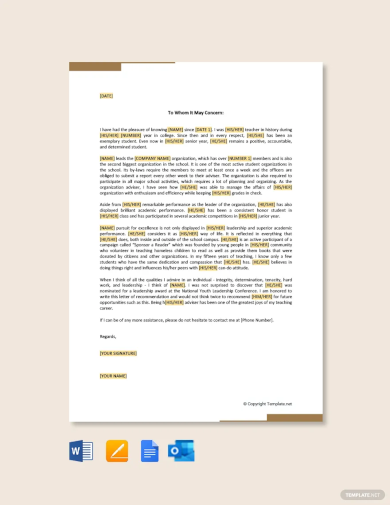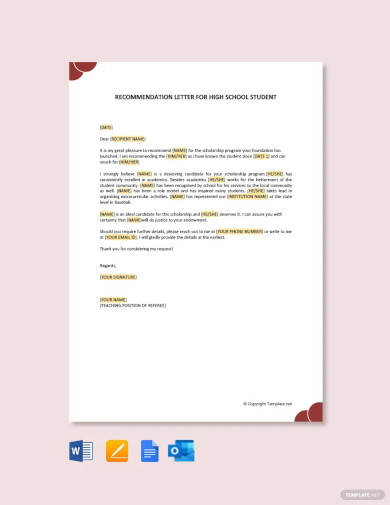25+ Student Recommendation Letter Examples to Download
A Student Recommendation Letter serves as a formal endorsement of a student’s skills, achievements, and character, typically written by a teacher, counselor, or mentor. This introduction allows the writer to establish their relationship with the student, outlining how long they have known the student and in what capacity. It provides context for the reader, indicating the credibility of the recommendation and the writer’s familiarity with the student. A strong introduction sets a positive tone, highlighting the student’s potential for success in future endeavors.
What is Student Recommendation Letter ?
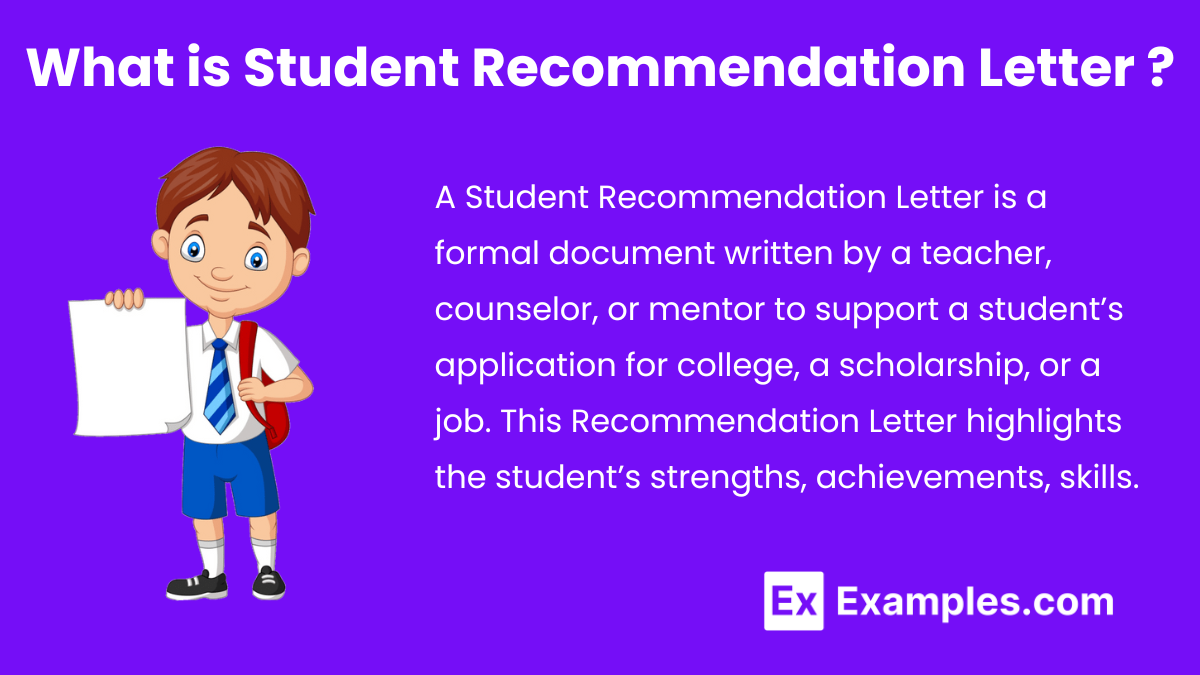
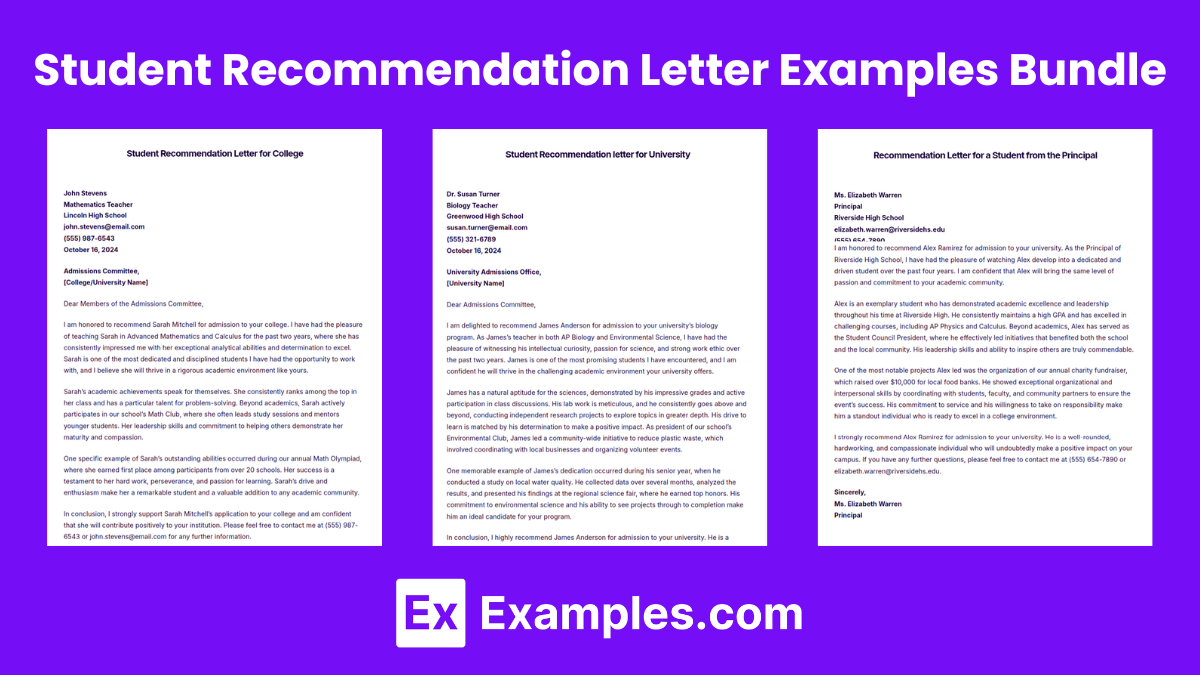
Download Student Recommendation Letter Examples Bundle
Student Recommendation Letter Format
Header
Your Name
Your Position/Title
School/Organization Name
Email Address
Phone Number
Date: [Insert Date]
Salutation
- Dear [Recipient’s Name],
- Or use “To Whom It May Concern” if the specific recipient is unknown.
Introduction
- State your relationship with the student and how long you’ve known them.
- Briefly mention the purpose of the letter and your general recommendation.
Body Paragraphs
First Paragraph:
Describe the student’s academic achievements, strengths, and relevant skills.Second Paragraph:
Highlight the student’s character, personal qualities, and contributions to the school or community.Third Paragraph (optional):
Share specific examples of the student’s accomplishments and how they stand out among their peers.
Conclusion
- Summarize your recommendation and express confidence in the student’s potential for success.
- Offer to provide additional information if needed.
Closing
- Use a formal closing such as “Sincerely” or “Best Regards”.
- Sign your name and include your contact information below your signature.
Student Recommendation Letter Example
Jessica Roberts
English Teacher
Springfield High School
jessica.roberts@email.com
(555) 123-4567
October 16, 2024
To Whom It May Concern:
I am thrilled to recommend Michael Thompson for admission to your college program. I have had the pleasure of teaching Michael in both English Literature and Creative Writing over the past three years, during which he has consistently impressed me with his intellectual curiosity, creativity, and determination.
Michael has a natural talent for writing and a keen analytical mind. His essays demonstrate a deep understanding of complex themes, and he consistently goes beyond what is required, bringing fresh insights into class discussions. His dedication to his studies is evident in his outstanding academic record, but he also excels beyond the classroom. As the president of our school’s Debate Club, Michael has shown leadership and the ability to inspire his peers, organizing and leading weekly practice sessions and several successful tournaments.
One moment that stands out was when Michael initiated a community writing workshop to help younger students improve their skills. He took charge of the project, developing lesson plans and mentoring participants with patience and enthusiasm. Michael’s ability to lead and his commitment to helping others are qualities that will make him a valuable asset to your institution.
I am confident that Michael will thrive in a college environment, and I strongly recommend him for admission. Please feel free to contact me at (555) 123-4567 or jessica.roberts@email.com if you need further information.
Sincerely,
Jessica Roberts
English Teacher
Student Recommendation Letter for College
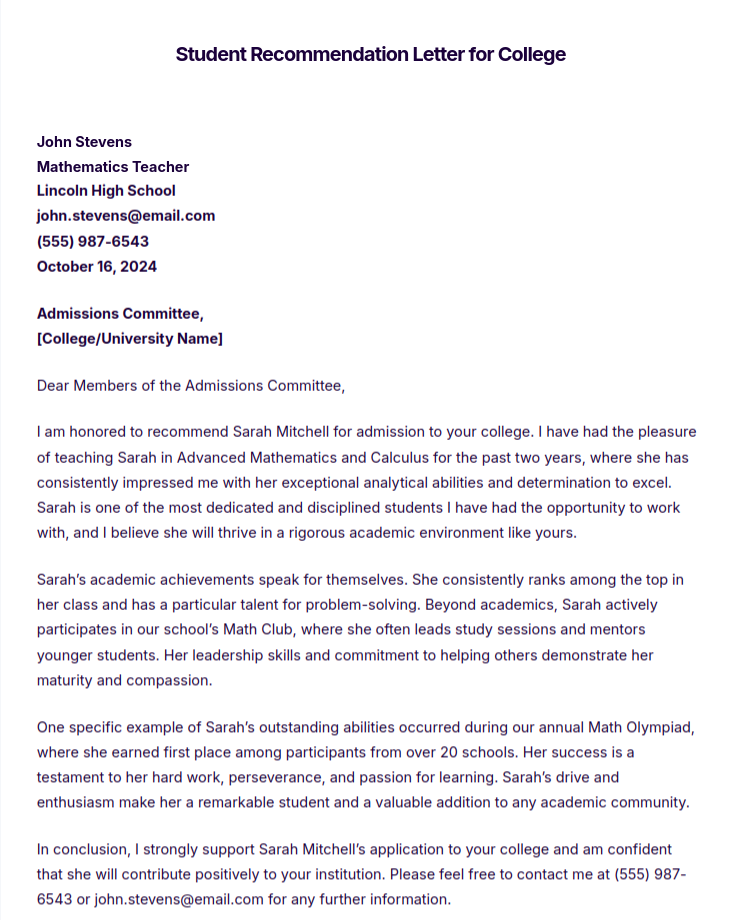
Student Recommendation Letter for University
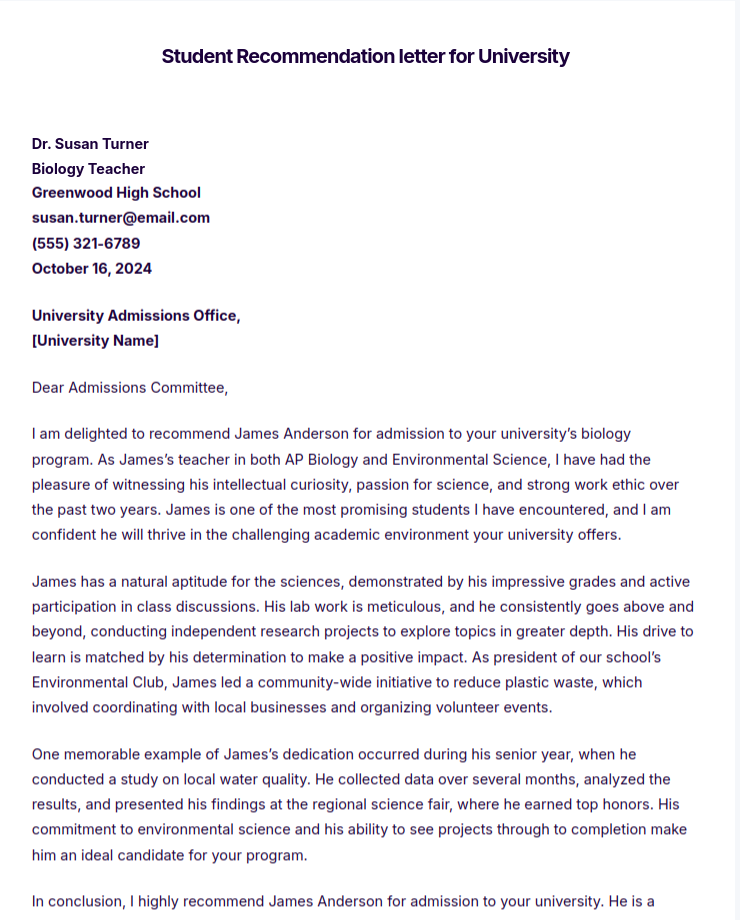
Recommendation Letter for a Student from the Principal
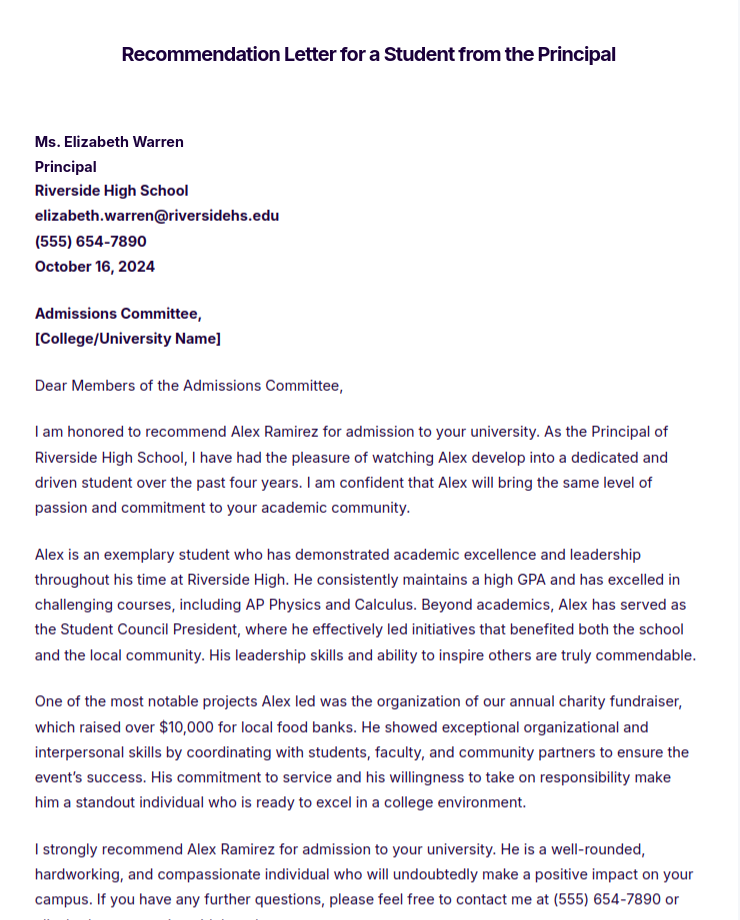
More Student Recommendation Letter Examples and Samples
- Student Recommendation Letter from Employer
- Student Recommendation Letter for National Honor Society
- Student Recommendation Letter for Private School
- Student Recommendation Letter from Church
- Student recommendation Letter for Student Council
Student Scholarship Recommendation Letter Template
Recommendation Letter for Student From Teacher Template
Recommendation Letter for Student Scholarship Template
Job Recommendation Letter for Student Template
Leadership Recommendation Letter for Student Template
Recommendation Letter Template for Student
Letter of Recommendation for Student Intern Template
Leadership Recommendation Letter for School Student Template
Recommendation Letter For High School Student Template
College Student Recommendation Letter Example
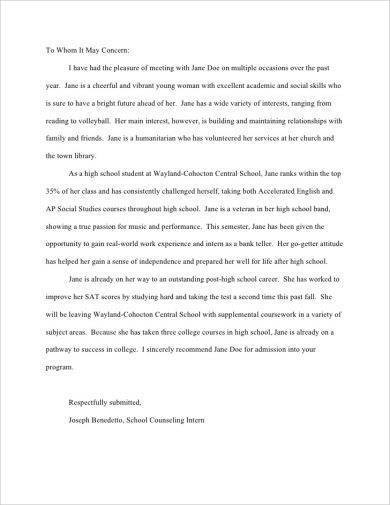
Graduate Student Recommendation Letter Example
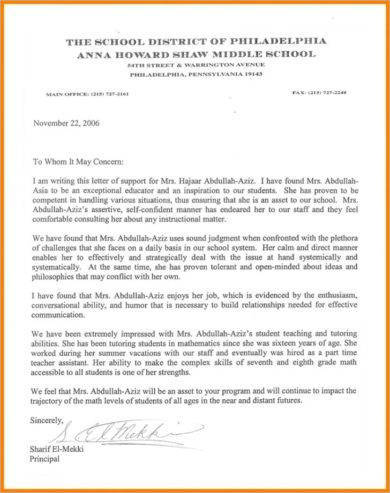
Nursing Student Recommendation Letter Example

Primary School Student Recommendation Letter Example

Student Scholarship Recommendation Letter Example
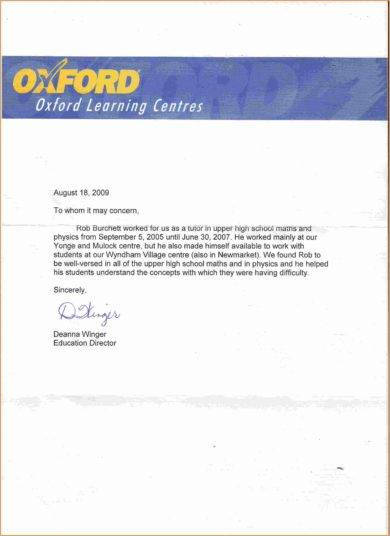
High School Student Recommendation Letter Example
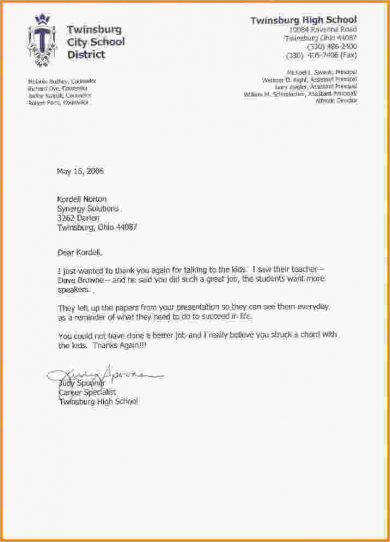
Medical Student Recommendation Letter Example
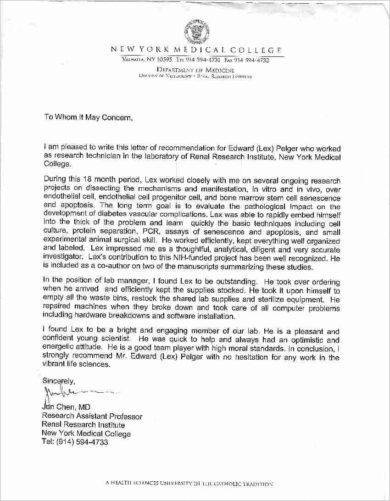
Student Recommendation Letters: What to Include
A lot of colleges utilize a holistic process when screening applicants. Rather than focusing solely on one’s grades and test scores, they seek to understand a person for who they are entirely. One way to do so is through the recommendation letters from teachers and counselors. You may also see reference letter examples.
To understand how student recommendation letters are used, let’s take a closer look into what colleges specifically look for in these letters:
1. Your strengths and interests
A recommendation letter is an important testament that provides a reader with an inside look to your ability to perform college-level work effectively. It’s not unusual for students to back out from a program they are in or completely drop out of college due to the amount of work and commitment that is demanded from them. You may also like employee reference letter samples.
For this reason, admissions officers need to make sure that these applicants are completely capable and willing to undergo whatever challenges they are set to face. They want to find students that could actually excel in the classroom, specifically those who are eager to learn new ideas and contribute to live discussions. You may also check out business reference letter examples.
After all, you can never grow as a student if you remain passive during classroom interactions. Thus, it’s an essential objective for admissions officers to find students that possess a strong interest in education.
2. Your personal qualities and role in your community
Sure, having exceptional grades and test scores can say a lot about your skills and abilities in the field of academics, but it doesn’t always illustrate the perfect picture of your personality and experience.
College is relatively different from what you’ve become accustomed to during your high school years and the years that came before that. This is a busy and transformative phase of your life that not everyone can adapt to immediately. This is why it’s important for admissions officers to look for students that could provide meaningful contributions to the community, and build positive relationships with other students. You might be interested in personal recommendation letter examples.
Admissions officers strive to admit students that could live, work, and play in harmony with one another. Building a class of students with diverse personalities and experiences that can help generate a strong community of learners. Anybody can work their way to receiving higher grades, but not everyone has this natural sense of leadership and creativity that can positively contribute to a growing community. You may also see promotion recommendation letter examples.
By selecting students based on their social skills and strength of character, they can create a healthy environment that will function smoothly enough to maximize the learning, growth, and development of students.
3. Your relationship with faculty members and classmates
How you interact with others says a lot about your personality. Given how college is composed of a highly collaborative and interactive environment, admissions officers always consider your relationship with others.
Most recommendation letters express one’s impression toward you, as well as the relationship being shared. This helps the officer gain a better sense of how you’re likely to act in a classroom setting. If the professional letter talks about your positive attitude when working as both a leader and a member of a group, then this creates an excellent impression regarding your skills in managing and cooperating in a group.
4. Your vision for yourself
Teachers and counselors know a lot about their students based on their performance in school. This goes beyond their marks on tests and exams, as this could also include their attitude and skills in fields that they excel at.
Some students are exceptional writers, while others are outstanding in arts and crafts. Not many students recognize the talents that they possess until somebody influential enough points it out for them.
Hence, all of the elements that are part of the recommendation letter provides a vision of your future direction. If you’re somebody who has played an active role in the school paper, even participating in inter school competitions and international events, then the admissions committee can get the sense that you might contribute to the university’s paper, take a degree related to communications, or pursue a career in journalism. You may also like reference letter examples.
So, why is this important?
Again, admissions officers hope to build a community of students that can grow in an environment of learning and opportunities. This ensures that a student’s time spent at a university isn’t wasted, and that the institution can successfully assemble the next generation of leaders and professionals who will contribute meaningful ideas and innovations to the world. You may also check out reference letter examples & samples.
Simple Student Recommendation Letter Example
Student Internship Recommendation Letter Example
Student Recommendation Letter Example
How to Prepare Yourself for the Real World
Getting an admission to the college of your dreams is an exciting experience, but this is only the initial step of the journey that you need to worry about. A letter of recommendation is nothing more than a formal letter format that can increase your chances of being accepted to a university or an internship program. After that, you’re basically on your own.
To survive the hurdles and shortcomings that the real world has to offer, here are a few reminders to keep you going:
1. Everyone is equal.
The type of students you’re likely to encounter in your college years reign from different walks of life. It doesn’t matter if you’re the heir of a multibillion dollar business or a valedictorian from a batch of five hundred public school students, as you reach college, none of this would matter to your classmates and professors. Everyone is treated equally, and you’re only judged based on how well you perform. You may also see personal reference letter examples.
2. Hard work does pay off.
The sleepless nights and coffee-filled mornings will always be worth it in the end. It might not seem like it at first, but you’ll soon realize that everything happens for a reason. Though you might not be running at the same pace as others, possibly failing to meet your own expectations at some points, your hard work and commitment to excellence will eventually pay off in the near future. You may also like reference letter for employment examples.
3. Sacrifices are part of growth.
Your afternoons spent with friends at your favorite hangout will soon turn into dates with books and projects at the campus library.
You might even miss some birthdays and holidays that are usually spent with family and friends because of the amount of work that needs to get done before the day ends.
Although a lot of sacrifices need to be made in order to bring you to where you aspire to be, this should not be an excuse to cut out important people from your life. Remember, not everyone will understand what you do until you learn to communicate with them every now and then. You may also check out academic reference letter examples.
4. Keep your circle small.
Not a lot of relationships can stand the test of time. Along the way, people are bound to grow envious and competitive of another person’s successes.
Instead of being proud of your achievements, these individuals create a plot to watch you fall. These are the people that will pull you down at any circumstance, which is why it’s important to keep your circle small. Avoid people who might be toxic to your life, as they may hinder you from accomplishing anything great. You might be interested in complaint letter examples.
5. Embrace change.
Change is inevitable, or so they say.
But it doesn’t happen overnight. It can be a slow, painful process that can greatly impact the way you live life. Rather than running away from the “change” that’s meant to happen, you must learn how to accept it. Put your fears aside and take the risk. You only have one life, so the best you could do is to make the most out of it. You may also see character reference letter examples.
Acquiring a credible recommendation letter is a task that requires mutual understanding from both parties. This is something that students must earn during their early years of education, and a responsibility that teachers and counselors possess in order to give students the chance to obtain the level of education that they deserve. You may also like business proposal letter examples.
A student recommendation letter is an important document that must be treated with value for it to serve its desired purpose effectively.
How To Write a Recommendation Letter for a Student ?
Writing a Recommendation Letter for a Student requires a thoughtful approach to highlight their strengths, achievements, and personal qualities. Here’s a step-by-step guide to help you craft an effective recommendation letter:
Understand the Purpose of the Letter
Determine the purpose: Is it for college admission, a scholarship, or a job application?
Gather information about the program or opportunity to align your letter with its requirements.Start with a Strong Introduction
Introduce Yourself: Briefly state your role, how you know the student, and how long you’ve known them.
Mention the Purpose: Explain why you are writing the recommendation and express your support for the student.Highlight Academic and Personal Qualities
Academic Strengths: Discuss the student’s achievements, skills, and unique qualities. Mention specific subjects or projects they excelled in.
Personal Traits: Describe the student’s character, work ethic, and how they interact with others. You might highlight their leadership, creativity, or resilience.Provide Specific Examples
Use anecdotes or specific instances to illustrate the student’s strengths and accomplishments. This helps make the letter more personal and credible.
For example, mention a successful project the student led or a challenge they overcame.Summarize Your Recommendation
Express Confidence: Conclude by summarizing why you recommend the student and why they would be a good fit for the opportunity.
Offer to Provide Further Information: Mention that you’re available for further discussion if needed.Close the Letter Professionally
Use a Formal Closing: End with “Sincerely,” “Best Regards,” or a similar closing.
Include Your Contact Information: Sign your name and include your title, email, and phone number for follow-up.
Tips for Writing a Student Recommendation Letter
- Start with a Strong Introduction
Begin with a brief introduction of who you are, how you know the student, and the context of your relationship. This sets a solid foundation and provides context for your endorsement. - Be Specific and Use Examples
Highlight the student’s achievements and character traits with specific examples. Avoid vague statements; instead, illustrate strengths with real situations to make the letter more compelling. - Focus on Relevant Skills and Traits
Tailor the content to align with the purpose of the recommendation, whether it’s for a college application, scholarship, or job. Highlight skills and traits that are particularly valuable in that context. - Maintain a Positive Tone
Keep the letter encouraging and positive. Even if you need to mention areas for growth, frame them in a way that shows the student’s willingness to improve and learn. - Be Honest and Authentic
Offer an honest assessment of the student while being mindful to avoid exaggeration. Authenticity will make your endorsement more credible and effective. - Keep it Concise and Well-Organized
Aim for a length of one to two pages, focusing on the most impactful information. Use headings and short paragraphs to make it easy to read and to emphasize key points. - End with a Strong Closing Statement
Reiterate your confidence in the student’s potential and suitability for the opportunity. Offer to be available for follow-up questions, and provide your contact information.
Uses of a Student Recommendation Letter
- College Applications
Most universities and colleges require recommendation letters as part of the application process. They help admissions officers understand the student’s potential fit and contribution to the campus community. - Scholarship Applications
Many scholarship programs ask for recommendation letters to evaluate the applicant’s academic achievements, leadership, and commitment to their goals. A strong letter can improve the chances of securing funding. - Internship and Job Applications
Employers often request recommendation letters for internships, part-time jobs, or entry-level positions. These letters can demonstrate the student’s work ethic, reliability, and relevant skills. - Graduate School Applications
For graduate programs, especially competitive ones, recommendation letters are crucial. They help convey the student’s readiness for advanced study and their potential for success in the field. - Leadership and Program Applications
Leadership programs, volunteer opportunities, or exchange programs may also require recommendation letters to assess the applicant’s suitability, maturity, and ability to positively contribute. - Personal Growth and Development
Receiving a recommendation letter can boost a student’s confidence and provide valuable feedback on their strengths and areas for improvement. This can be especially encouraging as they transition to new challenges.
FAQ’s
How long should a Student Recommendation Letter be?
A Student Recommendation Letter should be about one page in length. This ensures that it is detailed enough to provide insight but concise enough to hold the reader’s attention.
When should a Student Request a Recommendation Letter?
Students should request a recommendation letter at least 2-4 weeks before it is needed. This gives the writer ample time to compose a thoughtful and thorough letter without feeling rushed.
Can a Recommendation Letter be used for multiple applications?
Yes, if the content is general enough, a recommendation letter can be used for multiple applications. However, for tailored or specific programs, the writer may need to customize the letter to address particular requirements or characteristics of each opportunity.
How should a Student ask for a Recommendation Letter?
Students should ask for a recommendation letter in person, if possible, or through a polite email if not. They should provide details about the opportunity, the deadline, and why they chose that specific person to write their letter. It’s also helpful to offer any information that might assist the writer, such as transcripts, a resume, or a list of accomplishments.
Can a student see their Recommendation Letter?
This depends on the policies of the institution or program receiving the letter. Some letters are confidential, meaning the student does not have access to them, while others may allow the student to read the letter. If the letter is confidential, it can often carry more weight as it’s considered an unbiased endorsement.
25+ Student Recommendation Letter Examples to Download
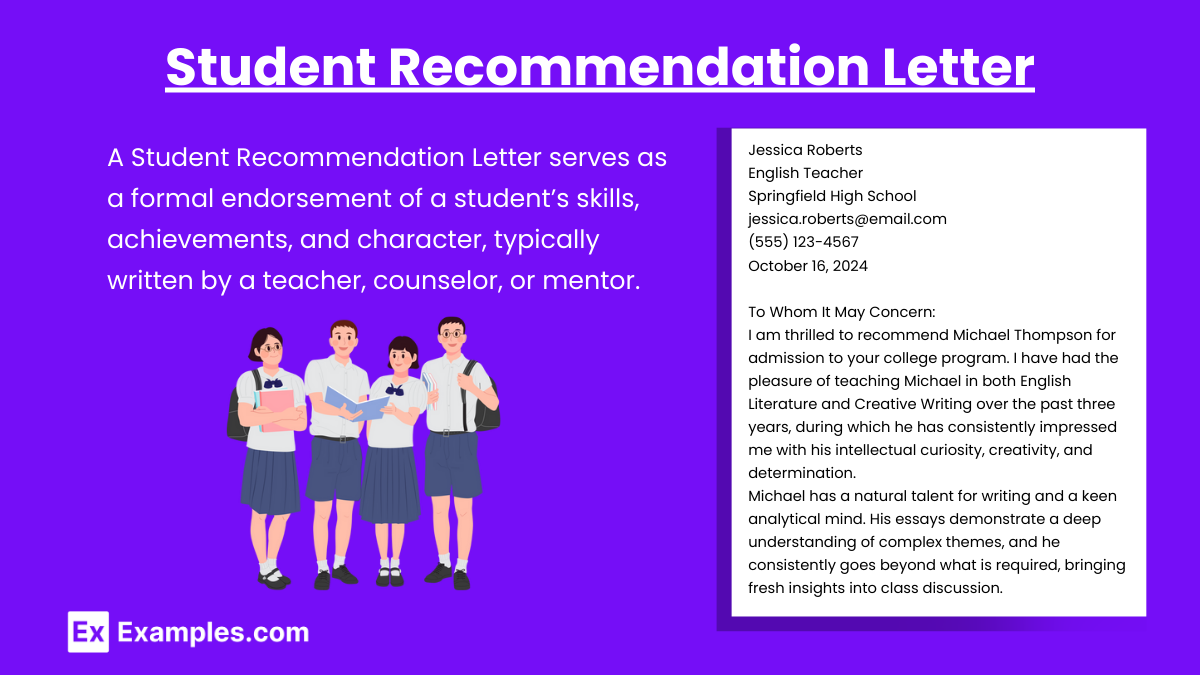
A Student Recommendation Letter serves as a formal endorsement of a student’s skills, achievements, and character, typically written by a teacher, counselor, or mentor. This introduction allows the writer to establish their relationship with the student, outlining how long they have known the student and in what capacity. It provides context for the reader, indicating the credibility of the recommendation and the writer’s familiarity with the student. A strong introduction sets a positive tone, highlighting the student’s potential for success in future endeavors.
What is Student Recommendation Letter ?

A Student Recommendation Letter is a formal document written by a teacher, counselor, or mentor to support a student’s application for college, a scholarship, or a job. This Recommendation Letter highlights the student’s strengths, achievements, skills, and character, providing insight into their academic and personal qualities. Typically, it includes specific examples of the student’s abilities and accomplishments, helping the recipient make informed decisions. Recommendation Letters play a crucial role in presenting the student as a well-rounded candidate who is likely to succeed in future endeavors.

Download Student Recommendation Letter Examples Bundle
Student Recommendation Letter Format
Header
Your Name
Your Position/Title
School/Organization Name
Email Address
Phone Number
Date: [Insert Date]
Salutation
Dear [Recipient’s Name],
Or use “To Whom It May Concern” if the specific recipient is unknown.
Introduction
State your relationship with the student and how long you’ve known them.
Briefly mention the purpose of the letter and your general recommendation.
Body Paragraphs
First Paragraph:
Describe the student’s academic achievements, strengths, and relevant skills.Second Paragraph:
Highlight the student’s character, personal qualities, and contributions to the school or community.Third Paragraph (optional):
Share specific examples of the student’s accomplishments and how they stand out among their peers.
Conclusion
Summarize your recommendation and express confidence in the student’s potential for success.
Offer to provide additional information if needed.
Closing
Use a formal closing such as “Sincerely” or “Best Regards”.
Sign your name and include your contact information below your signature.
Student Recommendation Letter Example
Jessica Roberts
English Teacher
Springfield High School
jessica.roberts@email.com
(555) 123-4567
October 16, 2024
To Whom It May Concern:
I am thrilled to recommend Michael Thompson for admission to your college program. I have had the pleasure of teaching Michael in both English Literature and Creative Writing over the past three years, during which he has consistently impressed me with his intellectual curiosity, creativity, and determination.
Michael has a natural talent for writing and a keen analytical mind. His essays demonstrate a deep understanding of complex themes, and he consistently goes beyond what is required, bringing fresh insights into class discussions. His dedication to his studies is evident in his outstanding academic record, but he also excels beyond the classroom. As the president of our school’s Debate Club, Michael has shown leadership and the ability to inspire his peers, organizing and leading weekly practice sessions and several successful tournaments.
One moment that stands out was when Michael initiated a community writing workshop to help younger students improve their skills. He took charge of the project, developing lesson plans and mentoring participants with patience and enthusiasm. Michael’s ability to lead and his commitment to helping others are qualities that will make him a valuable asset to your institution.
I am confident that Michael will thrive in a college environment, and I strongly recommend him for admission. Please feel free to contact me at (555) 123-4567 or jessica.roberts@email.com if you need further information.
Sincerely,
Jessica Roberts
English Teacher
Student Recommendation Letter for College

Student Recommendation Letter for University

Recommendation Letter for a Student from the Principal

More Student Recommendation Letter Examples and Samples
Student Scholarship Recommendation Letter Template
Recommendation Letter for Student From Teacher Template
Recommendation Letter for Student Scholarship Template
Job Recommendation Letter for Student Template
Leadership Recommendation Letter for Student Template
Recommendation Letter Template for Student
Letter of Recommendation for Student Intern Template
Leadership Recommendation Letter for School Student Template
Recommendation Letter For High School Student Template
College Student Recommendation Letter Example

Graduate Student Recommendation Letter Example

Nursing Student Recommendation Letter Example

Primary School Student Recommendation Letter Example

Student Scholarship Recommendation Letter Example

High School Student Recommendation Letter Example

Medical Student Recommendation Letter Example

Student Recommendation Letters: What to Include
A lot of colleges utilize a holistic process when screening applicants. Rather than focusing solely on one’s grades and test scores, they seek to understand a person for who they are entirely. One way to do so is through the recommendation letters from teachers and counselors. You may also see reference letter examples.
To understand how student recommendation letters are used, let’s take a closer look into what colleges specifically look for in these letters:
1. Your strengths and interests
A recommendation letter is an important testament that provides a reader with an inside look to your ability to perform college-level work effectively. It’s not unusual for students to back out from a program they are in or completely drop out of college due to the amount of work and commitment that is demanded from them. You may also like employee reference letter samples.
For this reason, admissions officers need to make sure that these applicants are completely capable and willing to undergo whatever challenges they are set to face. They want to find students that could actually excel in the classroom, specifically those who are eager to learn new ideas and contribute to live discussions. You may also check out business reference letter examples.
After all, you can never grow as a student if you remain passive during classroom interactions. Thus, it’s an essential objective for admissions officers to find students that possess a strong interest in education.
2. Your personal qualities and role in your community
Sure, having exceptional grades and test scores can say a lot about your skills and abilities in the field of academics, but it doesn’t always illustrate the perfect picture of your personality and experience.
College is relatively different from what you’ve become accustomed to during your high school years and the years that came before that. This is a busy and transformative phase of your life that not everyone can adapt to immediately. This is why it’s important for admissions officers to look for students that could provide meaningful contributions to the community, and build positive relationships with other students. You might be interested in personal recommendation letter examples.
Admissions officers strive to admit students that could live, work, and play in harmony with one another. Building a class of students with diverse personalities and experiences that can help generate a strong community of learners. Anybody can work their way to receiving higher grades, but not everyone has this natural sense of leadership and creativity that can positively contribute to a growing community. You may also see promotion recommendation letter examples.
By selecting students based on their social skills and strength of character, they can create a healthy environment that will function smoothly enough to maximize the learning, growth, and development of students.
3. Your relationship with faculty members and classmates
How you interact with others says a lot about your personality. Given how college is composed of a highly collaborative and interactive environment, admissions officers always consider your relationship with others.
Most recommendation letters express one’s impression toward you, as well as the relationship being shared. This helps the officer gain a better sense of how you’re likely to act in a classroom setting. If the professional letter talks about your positive attitude when working as both a leader and a member of a group, then this creates an excellent impression regarding your skills in managing and cooperating in a group.
4. Your vision for yourself
Teachers and counselors know a lot about their students based on their performance in school. This goes beyond their marks on tests and exams, as this could also include their attitude and skills in fields that they excel at.
Some students are exceptional writers, while others are outstanding in arts and crafts. Not many students recognize the talents that they possess until somebody influential enough points it out for them.
Hence, all of the elements that are part of the recommendation letter provides a vision of your future direction. If you’re somebody who has played an active role in the school paper, even participating in inter school competitions and international events, then the admissions committee can get the sense that you might contribute to the university’s paper, take a degree related to communications, or pursue a career in journalism. You may also like reference letter examples.
So, why is this important?
Again, admissions officers hope to build a community of students that can grow in an environment of learning and opportunities. This ensures that a student’s time spent at a university isn’t wasted, and that the institution can successfully assemble the next generation of leaders and professionals who will contribute meaningful ideas and innovations to the world. You may also check out reference letter examples & samples.
Simple Student Recommendation Letter Example

dolap.magnetband.co
Student Internship Recommendation Letter Example
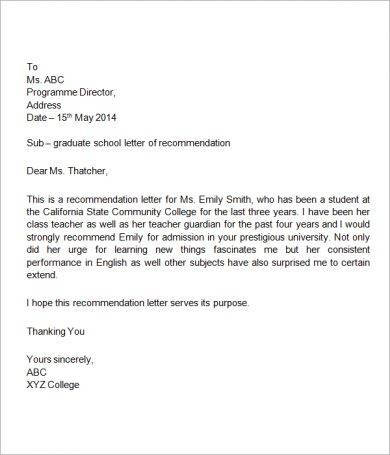
dolap.magnetband.co
Student Recommendation Letter Example
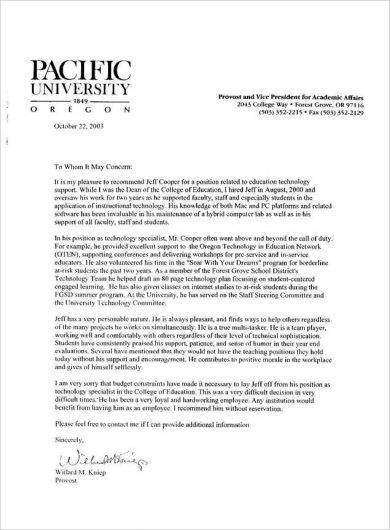
ideal.vistalist.co
How to Prepare Yourself for the Real World
Getting an admission to the college of your dreams is an exciting experience, but this is only the initial step of the journey that you need to worry about. A letter of recommendation is nothing more than a formal letter format that can increase your chances of being accepted to a university or an internship program. After that, you’re basically on your own.
To survive the hurdles and shortcomings that the real world has to offer, here are a few reminders to keep you going:
1. Everyone is equal.
The type of students you’re likely to encounter in your college years reign from different walks of life. It doesn’t matter if you’re the heir of a multibillion dollar business or a valedictorian from a batch of five hundred public school students, as you reach college, none of this would matter to your classmates and professors. Everyone is treated equally, and you’re only judged based on how well you perform. You may also see personal reference letter examples.
2. Hard work does pay off.
The sleepless nights and coffee-filled mornings will always be worth it in the end. It might not seem like it at first, but you’ll soon realize that everything happens for a reason. Though you might not be running at the same pace as others, possibly failing to meet your own expectations at some points, your hard work and commitment to excellence will eventually pay off in the near future. You may also like reference letter for employment examples.
3. Sacrifices are part of growth.
Your afternoons spent with friends at your favorite hangout will soon turn into dates with books and projects at the campus library.
You might even miss some birthdays and holidays that are usually spent with family and friends because of the amount of work that needs to get done before the day ends.
Although a lot of sacrifices need to be made in order to bring you to where you aspire to be, this should not be an excuse to cut out important people from your life. Remember, not everyone will understand what you do until you learn to communicate with them every now and then. You may also check out academic reference letter examples.
4. Keep your circle small.
Not a lot of relationships can stand the test of time. Along the way, people are bound to grow envious and competitive of another person’s successes.
Instead of being proud of your achievements, these individuals create a plot to watch you fall. These are the people that will pull you down at any circumstance, which is why it’s important to keep your circle small. Avoid people who might be toxic to your life, as they may hinder you from accomplishing anything great. You might be interested in complaint letter examples.
5. Embrace change.
Change is inevitable, or so they say.
But it doesn’t happen overnight. It can be a slow, painful process that can greatly impact the way you live life. Rather than running away from the “change” that’s meant to happen, you must learn how to accept it. Put your fears aside and take the risk. You only have one life, so the best you could do is to make the most out of it. You may also see character reference letter examples.
Acquiring a credible recommendation letter is a task that requires mutual understanding from both parties. This is something that students must earn during their early years of education, and a responsibility that teachers and counselors possess in order to give students the chance to obtain the level of education that they deserve. You may also like business proposal letter examples.
A student recommendation letter is an important document that must be treated with value for it to serve its desired purpose effectively.
How To Write a Recommendation Letter for a Student ?
Writing a Recommendation Letter for a Student requires a thoughtful approach to highlight their strengths, achievements, and personal qualities. Here’s a step-by-step guide to help you craft an effective recommendation letter:
Understand the Purpose of the Letter
Determine the purpose: Is it for college admission, a scholarship, or a job application?
Gather information about the program or opportunity to align your letter with its requirements.Start with a Strong Introduction
Introduce Yourself: Briefly state your role, how you know the student, and how long you’ve known them.
Mention the Purpose: Explain why you are writing the recommendation and express your support for the student.Highlight Academic and Personal Qualities
Academic Strengths: Discuss the student’s achievements, skills, and unique qualities. Mention specific subjects or projects they excelled in.
Personal Traits: Describe the student’s character, work ethic, and how they interact with others. You might highlight their leadership, creativity, or resilience.Provide Specific Examples
Use anecdotes or specific instances to illustrate the student’s strengths and accomplishments. This helps make the letter more personal and credible.
For example, mention a successful project the student led or a challenge they overcame.Summarize Your Recommendation
Express Confidence: Conclude by summarizing why you recommend the student and why they would be a good fit for the opportunity.
Offer to Provide Further Information: Mention that you’re available for further discussion if needed.Close the Letter Professionally
Use a Formal Closing: End with “Sincerely,” “Best Regards,” or a similar closing.
Include Your Contact Information: Sign your name and include your title, email, and phone number for follow-up.
Tips for Writing a Student Recommendation Letter
Start with a Strong Introduction
Begin with a brief introduction of who you are, how you know the student, and the context of your relationship. This sets a solid foundation and provides context for your endorsement.Be Specific and Use Examples
Highlight the student’s achievements and character traits with specific examples. Avoid vague statements; instead, illustrate strengths with real situations to make the letter more compelling.Focus on Relevant Skills and Traits
Tailor the content to align with the purpose of the recommendation, whether it’s for a college application, scholarship, or job. Highlight skills and traits that are particularly valuable in that context.Maintain a Positive Tone
Keep the letter encouraging and positive. Even if you need to mention areas for growth, frame them in a way that shows the student’s willingness to improve and learn.Be Honest and Authentic
Offer an honest assessment of the student while being mindful to avoid exaggeration. Authenticity will make your endorsement more credible and effective.Keep it Concise and Well-Organized
Aim for a length of one to two pages, focusing on the most impactful information. Use headings and short paragraphs to make it easy to read and to emphasize key points.End with a Strong Closing Statement
Reiterate your confidence in the student’s potential and suitability for the opportunity. Offer to be available for follow-up questions, and provide your contact information.
Uses of a Student Recommendation Letter
College Applications
Most universities and colleges require recommendation letters as part of the application process. They help admissions officers understand the student’s potential fit and contribution to the campus community.Scholarship Applications
Many scholarship programs ask for recommendation letters to evaluate the applicant’s academic achievements, leadership, and commitment to their goals. A strong letter can improve the chances of securing funding.Internship and Job Applications
Employers often request recommendation letters for internships, part-time jobs, or entry-level positions. These letters can demonstrate the student’s work ethic, reliability, and relevant skills.Graduate School Applications
For graduate programs, especially competitive ones, recommendation letters are crucial. They help convey the student’s readiness for advanced study and their potential for success in the field.Leadership and Program Applications
Leadership programs, volunteer opportunities, or exchange programs may also require recommendation letters to assess the applicant’s suitability, maturity, and ability to positively contribute.Personal Growth and Development
Receiving a recommendation letter can boost a student’s confidence and provide valuable feedback on their strengths and areas for improvement. This can be especially encouraging as they transition to new challenges.
FAQ’s
How long should a Student Recommendation Letter be?
A Student Recommendation Letter should be about one page in length. This ensures that it is detailed enough to provide insight but concise enough to hold the reader’s attention.
When should a Student Request a Recommendation Letter?
Students should request a recommendation letter at least 2-4 weeks before it is needed. This gives the writer ample time to compose a thoughtful and thorough letter without feeling rushed.
Can a Recommendation Letter be used for multiple applications?
Yes, if the content is general enough, a recommendation letter can be used for multiple applications. However, for tailored or specific programs, the writer may need to customize the letter to address particular requirements or characteristics of each opportunity.
How should a Student ask for a Recommendation Letter?
Students should ask for a recommendation letter in person, if possible, or through a polite email if not. They should provide details about the opportunity, the deadline, and why they chose that specific person to write their letter. It’s also helpful to offer any information that might assist the writer, such as transcripts, a resume, or a list of accomplishments.
Can a student see their Recommendation Letter?
This depends on the policies of the institution or program receiving the letter. Some letters are confidential, meaning the student does not have access to them, while others may allow the student to read the letter. If the letter is confidential, it can often carry more weight as it’s considered an unbiased endorsement.


